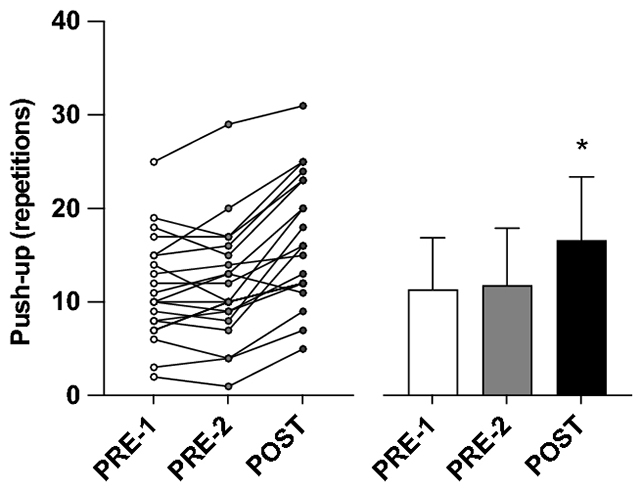New research adds to a mounting body of evidence showing that even a small amount of daily exercise can make a difference. In this study, just five minutes of strength training activity per day was found to have both physical and mental health benefits.
Led by a team from Edith Cowan University (ECU) in Australia, the study put 22 "sedentary but healthy" people through an eccentric training program, where bodyweight was used to build up strength. The exercises included chair squats, chair reclines, wall push-ups, and heel drops.
After four weeks of completing this exercise routine on most days, the group showed a significant average improvement in muscle strength, strength endurance, and flexibility, as well as a small drop in average post-exercise heart rate across the group (indicating better cardiovascular health). The participants also reported a boost to their mental health.

"The results highlighted that eccentric exercises are very effective in improving fitness," says ECU sports scientist Ken Nosaka.
"This type of exercise is also more accessible to most people, as it makes use of body weight and eliminates the need to go to a gym."
Both the brief exercise time and the accessibility of the routines are important for people with hectic schedules, and the researchers suggest these exercises could be spread out through the day, making them easier to stick with.

Another bonus from the study: 83 percent of participants who were surveyed four weeks later said they had continued with the same or similar exercises. That's a win, considering how many of us don't put in the recommended amount of exercise (which generally speaking is at least 2.5 hours of moderate-intensity physical activity per week).
The researchers aren't saying these guidelines should be ignored – more exercise will mean more benefits – but that any amount of exercise we can fit in will give our physical and mental health a boost.
"The guidelines are for 150 minutes a week of exercise, but that figure can often discourage people, especially if they are just starting out," says Nosaka.
"Using five minutes a day as a starting point and building on that, would allow people to see more results."
Many previous studies have highlighted the benefits that can come from just a few minutes of exercise, whether it's 15 minutes of high-intensity interval training, or 12 minutes of vigorous exercise.
And while the exercise program didn't make a significant difference in other areas, including resting heart rate or blood pressure, it's a reminder of the importance of staying active and the positive effects it has.
"As you get older, your fitness level will decline by 1 percent to 2 percent a year on average," says Nosaka. "So, for someone who is 50 years old their fitness levels will be 20 percent less compared to when they were 30 years old."
"Performing exercises regularly is very important, particularly as people get older, as it lowers the risk of chronic disease, injury, fatigue, and helps with mental health."
The research has been published in the European Journal of Applied Physiology.
